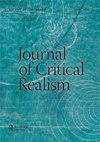The truth will set you free (ceteris paribus): incorporating prescriptive power in the rational judgement of theory
IF 2.9
0 PHILOSOPHY
引用次数: 0
Abstract
ABSTRACTThis paper argues that in the search for explanatory power, critical realist research has neglected, trivialized, or dismissed prescriptive power, the capacity for an explanation to offer insights for informing practical ameliorative action. In addition to explanatory power and multitheoretic-linguality, the effective exercise of judgmental rationality also requires a consideration of prescriptive power, else it fails to realize its emancipatory commitment. Building on previous discussions of the criteria for judgmental rationality, the paper considers a prescriptive fallacy in critical realist research that conflates explanatory and prescriptive power, and that instead researchers have a prescriptive commitment which can be realized in part through reflective questioning. The paper hopes to stimulate reflection and debate on the role of prescriptive power throughout the research process, and thereby support increased impact in research.KEYWORDS: Relevanceimpactdepth inquirycritical realismactionabilityprescriptive power Disclosure statementNo potential conflict of interest was reported by the author(s).Notes1 Diagnosis replaces the word description when it involves depth inquiry, but in any case, is preceded by description (Bhaskar Citation2010, 84).2 See Naess (Citation2004).Additional informationFundingThis work was supported by University of Barcelona Vice Rectorate of Research Grant for projects in emerging topics [UB-AE-AS017636].真理会让你自由(其他条件不变):在理论的理性判断中纳入规定的力量
摘要本文认为,在寻找解释力的过程中,批判现实主义的研究忽视、轻视或摒弃了规定性的力量,而规定性的力量是一种解释为实际的改进行动提供洞见的能力。判断理性的有效运用除了解释力和多理论语言性外,还需要考虑规定性权力,否则就无法实现其解放承诺。在先前关于判断理性标准的讨论的基础上,本文考虑了批判现实主义研究中的一种规定谬误,这种谬误将解释和规定的权力混为一谈,相反,研究人员有一种规定的承诺,这种承诺可以通过反思性质疑部分实现。这篇论文希望激发人们对规范权力在整个研究过程中的作用的反思和辩论,从而支持在研究中增加影响力。关键词:相关性影响深度探究关键现实性可操作性规定性权力披露声明作者未报告潜在利益冲突注1当涉及深度查询时,Diagnosis取代description一词,但在任何情况下,前面都要加description (Bhaskar Citation2010, 84)参见Naess (Citation2004)。本研究得到了巴塞罗那大学研究基金副校长对新兴课题项目的支持[UB-AE-AS017636]。
本文章由计算机程序翻译,如有差异,请以英文原文为准。
求助全文
约1分钟内获得全文
求助全文

 求助内容:
求助内容: 应助结果提醒方式:
应助结果提醒方式:


